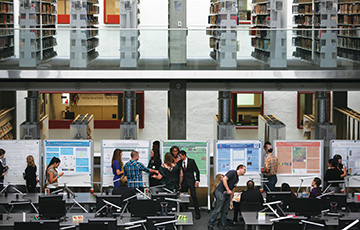Inventing New Knowledge: An Invitation
By Kathryn Leonard, Associate Professor of Mathematics and Director of the Center for Integrative Studies
What do you get when you put a firefighter, x-ray technician, deli worker, and dirt bike enthusiast together in one room? A CI student research group! This year, eight students under my supervision are mathematically modeling shapes of objects in images. Some students will develop new mathematical theory, others will predict forest fire growth, still others will archive dance choreography.
After graduation, my research students typically enter graduate programs in mathematics or statistics, or begin work at places like Jet Propulsion Laboratory and Naval Air Systems Command. One student now at Lockheed-Martin spent most of her job interview answering questions about her research project. Indeed, she credits her research experience for landing the job. Why? Because research involves facing a problem with no known solution and figuring out how to solve it. In other words, research is a lot like handling problems in real life. Participating in research shows employers you are willing to reach beyond standard expectations, and that you can apply knowledge to new situations.
CI offers many opportunities for student research.
- The Hank Lacayo Institute Research Fellows Program funds students up to $3000 per year to work with a faculty member on a research project of the student’s choosing. The first cohort of HLI Research Fellows will be announced in October.
- SPIRaL courses, UNIV 198, 298, 398, engage students in interdisciplinary research starting in freshman year. An upcoming 198 course will tackle an art mystery that developed when a ceramicist famous for his yellow glaze died without sharing the recipe. Students will work to reconstruct the glaze using techniques from chemistry and art.
- UNIV 498 courses involve students in faculty research. Students in an archaeologist’s 498 course retrieve and analyze artifacts from ancient Chumash sites. In a computer scientist’s course, students design soccer-playing robots. Education students study the impact of advocacy groups on disability awareness.
- Many individual faculty support research students outside a formal program. In biology, one such group explores bee pollination behavior.
- Research opens doors for students even before they graduate. A UNIV 298 student cites her research experience as the reason she was selected for a summer internship studying abalone. CI’s two Goldwater Scholars earned the honor because of their research success as sophomores. More generally, engaging students in research increases graduation rates, improves grades, and boosts satisfaction with college.
What are you waiting for? Find (or fund!) a project today.
